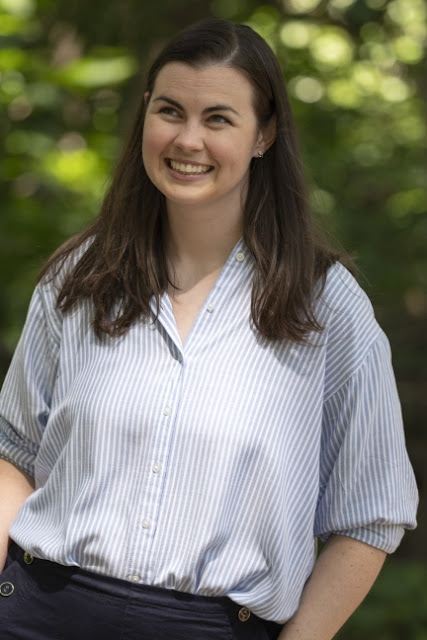Amanda Quain
 |
| photo credit: Rosalinda Dauval |
My Q&A with the author:
How much work does your title do to take readers into the story?
Accomplished is, as a title, going to offer different things for different readers! For the Austen fan, it’s a direct line to Georgiana Darcy (or, if not to her, at least to a very Regency requirement.) Almost every time Georgiana is discussed in the original text, she’s referenced as accomplished – it’s basically her main character trait.
The (very early on) original working title was Georgie Darcy’s Back on Top, which is definitely more obvious, but I absolutely adore Accomplished and wouldn’t change it – it’s an intriguing title for those new to Austen and a nice wink and nod to my fellow Austen fans.
What's in a name?
The beauty of writing adaptations is that most of the names are already there! I did choose to use nicknames for most of the characters to give the book a more modern feel – plus, in Georgie’s case, the use of her nickname is a sticking point in the strained relationship with her extra-posh mother. It gets shortened even more to ‘George’ by her one friend (and maybe eventually love interest???), Avery, which I just love as an instant way of showing intimacy between two characters. Developing their intimacy verbally – through banter, through inside jokes, through the shared rhythm of their speaking that only they share – was one of the greatest joys of this book.
My only other surprising name choice would be renaming Mr. Darcy as Fitz, short for Fitzwilliam, if only because most adaptations name him Will. I also changed the name of our main antagonist, George Wickham, to make Wickham his first name. Jane Austen may have been able to get away with giving all of her characters the same three names, but in contemporary books, that sort of thing is more frowned upon!
How surprised would your teenage reader self be by your new novel?
The first few books I wrote all had fantasy or speculative twists, so she might be surprised to see that I’d landed in contemporary – but in retrospect, I’d been preparing for this my whole reading life. While I do love reading big splashy fantasy or sci-fi novels, my comfort books, the books I return to over and over again, are all contemporary. There’s a direct line from the dozens of Meg Cabot books I inhaled as a child to Accomplished.
Do you find it harder to write beginnings or endings? Which do you change more?
Beginnings, for sure! It’s funny – of all of my projects, Accomplished is the only one where the opening is essentially unchanged from the initial draft. In fact, the opening line – “My big brother, Fitzwilliam Darcy, could suck it” – actually is the same first line from my very first draft.
Usually, though, it takes me three or four tries to get to the correct starting point. I love writing endings; it’s so satisfying to wrap up everything you’ve been working towards, to make the point you’ve been hinting at the entire story. Plus, endings usually have a lot more kissing than beginnings do.Visit Amanda Quain's website.
Do you see much of yourself in your characters? Do they have any connection to your personality, or are they a world apart?
While no one character in this book has an exact real-world equivalent, I’ve hidden bits of myself and my loved ones all over the page. Georgie’s stubbornness and determination is all me, and so is her older brother Fitz’s fierce protectiveness. The way that Georgie and her best guy Avery talk to each other is the same rhythm that my husband and I always fall into. I think that it’s hard to write charactersthat aren’t connected to you in some way – even if they’re almost entirely different, I need some thread of connectivity to make them sound authentic and lived in.
What non-literary inspirations have influenced your writing?
This book would not exist without its non-literary inspirations! Most heavily, it’s influenced by Clueless and Legally Blonde which, in addition to both being near-perfect movies, do an amazing job of taking a protagonist who doesn’t realize the influence she’s having on the world around her and allowing her to grow without forcing her to change.
Clueless, in particular, was one of the first pieces of media that showed me the full breadth of what an adaptation could be. Jane Austen would recognize almost nothing from the world that Clueless inhabits, but she would still recognize the characters as her own (Clueless, for any who may not know, is based on Austen’s Emma) and I think that’s just absolutely spectacular. Accomplished has sometimes been pitched as ‘finally giving Georgiana Darcy the Clueless treatment she always deserved’, and I really tried to imbue the book with that same sense of fun. (Even if I’ll never write a put-down as utterly devastating as “you’re a virgin who can’t drive.” Way harsh, Tai.)
--Marshal Zeringue
